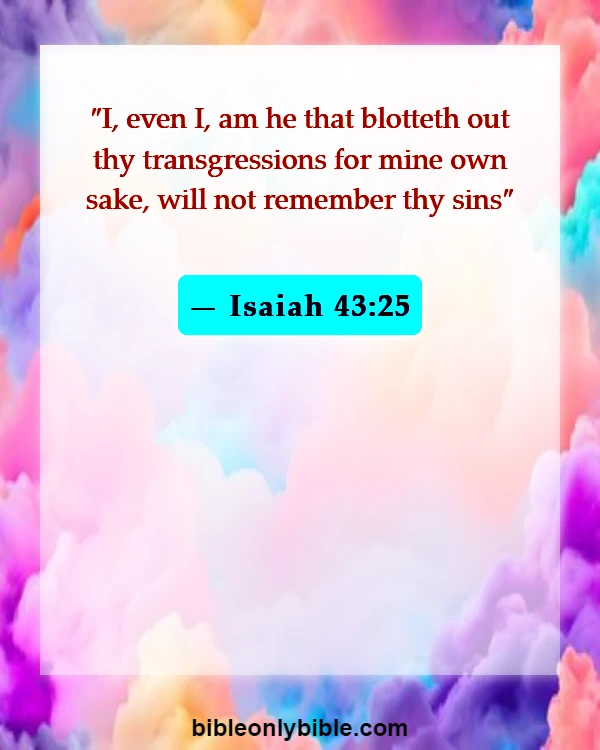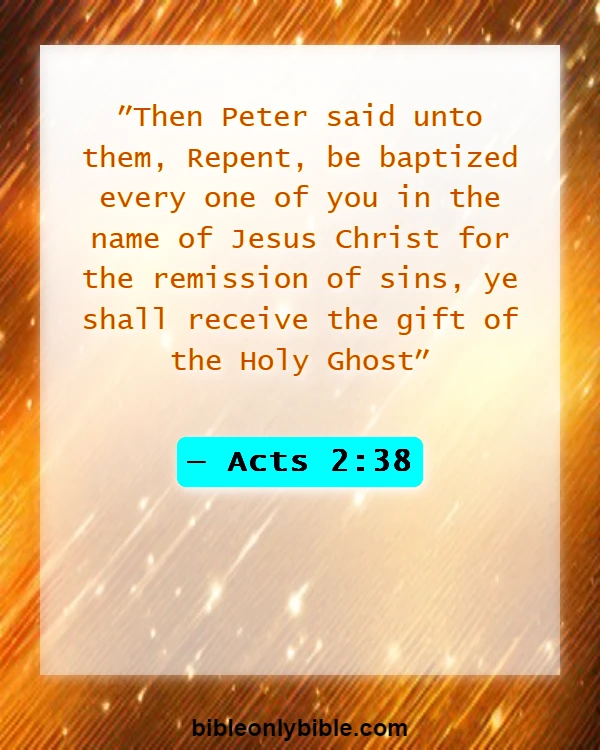Searching for insights on ‘Only God Can Forgive Sins Bible Verses’? You’ve come to the right place. Today’s content is designed for those seeking to understand the biblical perspective on forgiveness of sins. Here, we’ll explore Bible verses that highlight God’s unique authority to forgive sins. These scriptures will help you better grasp the concept of divine forgiveness and its significance in Christian theology. Let’s delve into what the Bible says about God’s exclusive power to pardon transgressions.
Contents
- 1 What Does the Bible Say About God’s Exclusive Power to Forgive Sins?
- 2 Key Bible Verses That Show Only God Can Forgive Sins
- 3 Why Can’t Humans Forgive Sins According to Scripture?
- 4 Jesus Christ’s Authority to Forgive Sins as God
- 4.1 Mark 2:5 – Jesus forgives sins, demonstrating divine authority
- 4.2 John 8:11 – Jesus forgives sins, demonstrating divine authority
- 4.3 Luke 7:48 – Jesus forgives sins, demonstrating divine authority
- 4.4 Matthew 26:28 – Jesus’ blood seals the covenant for forgiveness
- 4.5 Acts 10:43 – Jesus grants forgiveness through belief in Him
- 4.6 Luke 23:34 – Jesus asks forgiveness for those who crucified him
- 5 Old Testament Verses About God’s Forgiveness and Mercy
- 6 New Testament Passages on Divine Forgiveness
- 6.1 Ephesians 1:7 – Redemption and forgiveness through Christ’s sacrificial blood
- 6.2 1 John 1:7 – Walking in light, cleansed by Jesus’ blood
- 6.3 Acts 2:38 – Repentance and baptism for forgiveness through Jesus
- 6.4 Romans 4:7 – Blessed are forgiven, covered transgressions
- 6.5 2 Corinthians 5:19 – God reconciles through Christ, not counting sins
- 7 How Does God’s Exclusive Forgiveness Differ from Human Forgiveness?
- 8 What This Means for Christians Seeking Forgiveness Today
What Does the Bible Say About God’s Exclusive Power to Forgive Sins?
God’s ability to forgive sins is central to our faith. It’s an assurance that despite our imperfections, there is hope for redemption. This divine power is unique to God, emphasizing His unmatched authority and mercy. Understanding this truth can transform how we view repentance and grace in our own lives. Let’s explore what the Bible reveals about this profound truth.

Why doth this man thus speak blasphemies? who can forgive sins but God only?
Mark 2:7
Explanation:- In this verse, religious leaders question Jesus’ authority to forgive sins, highlighting the belief that only God has the power to do so. This moment underscores the divine authority of Jesus, provoking deeper reflection on His identity and mission.
Isaiah 43:25 – God alone forgives and forgets our sins

I, even I, am he that blotteth out thy transgressions for mine own sake, will not remember thy sins
Isaiah 43:25
Explanation:- This verse highlights God’s unique authority to forgive and erase our sins, underscoring that forgiveness is solely His domain. It reassures us that God not only pardons but also forgets our transgressions, emphasizing His unparalleled mercy and grace.
1 John 1:9 – God’s forgiveness requires confession

If we confess our sins, he is faithful just to forgive us our sins, to cleanse us from all unrighteousness
1 John 1:9
Explanation:- God’s forgiveness hinges on our sincere confession and repentance. This verse highlights that while God alone has the power to forgive sins, our role is to openly acknowledge our wrongdoings, trusting in His faithfulness and justice to cleanse us from all unrighteousness.
Psalm 103:3 – God forgives all sins and heals all diseases

Who forgiveth all thine iniquities; who healeth all thy diseases
Psalm 103:3
Explanation:- Psalm 103:3 highlights God’s unique authority to forgive sins and bring healing. It underscores the belief that only God possesses the ultimate power to cleanse and restore, offering spiritual renewal and physical healing to those who seek His grace and mercy.
Key Bible Verses That Show Only God Can Forgive Sins
The Bible clearly teaches that forgiveness of sins is a divine prerogative. This understanding frames our relationship with God, reminding us of our need for His grace. These verses highlight that no human power can absolve sins, drawing us closer to the heart of God and His capacity for mercy. Let’s look at some key scriptures that illustrate this truth.
The scribes the Pharisees began to reason, saying, Who is this which speaketh blasphemies? Who can forgive sins, but God alone?
Luke 5:21
Explanation:- In this verse, the scribes and Pharisees question Jesus’ authority to forgive sins, believing that only God holds this power. This highlights the divine authority of Jesus and underscores the belief that forgiveness is ultimately a divine act, affirming God’s unique role.

But that ye may know that the Son of man hath power on earth to forgive sins, (then saith he to the sick of the palsy,) Arise, take up thy bed, go unto thine house
Matthew 9:6
Explanation:- In this verse, Jesus demonstrates His divine authority by forgiving sins, highlighting His identity as God incarnate. It underscores the belief that only God can forgive sins, affirming Jesus’ divine nature and His power to heal both spiritually and physically.
Colossians 1:14 – Redemption and forgiveness through Christ
In whom we have redemption through his blood, even the forgiveness of sins
Colossians 1:14
Explanation:- In this verse, the focus is on the redemption and forgiveness we receive through Christ. It highlights the belief that only God, through Jesus, can grant true forgiveness for our sins, emphasizing the divine nature of forgiveness and salvation.
Isaiah 1:18 – God forgives sins, making them white as snow

Come now, let us reason together, saith the Lord : though your sins be as scarlet, they shall be as white as snow; though they be red like crimson, they shall be as wool
Isaiah 1:18
Explanation:- Isaiah 1:18 highlights God’s power to forgive sins, transforming them from scarlet to white as snow. This verse underscores that only God has the authority to cleanse and renew, offering hope and redemption through divine grace and mercy.
Ephesians 4:32 – Be kind, forgive as God forgives

Be ye kind one to another, tenderhearted, forgiving one another, even as God for Christ’s sake hath forgiven you
Ephesians 4:32
Explanation:- Ephesians 4:32 encourages us to embody kindness and compassion, forgiving others just as God forgives us. While God holds the ultimate power to forgive sins, this verse reminds us to mirror His grace by offering forgiveness in our relationships.
Why Can’t Humans Forgive Sins According to Scripture?
Scripture makes it clear that forgiving sins is beyond human ability. This concept humbles us, reminding us of our limitations and our need for God’s intervention. It also liberates us from the burden of judgment, freeing us to focus on love and compassion. Let’s delve into why only God holds this power according to the Bible.
Romans 3:23 – All have sinned, falling short of God’s glory

For all have sinned, come short of the glory of God
Romans 3:23
Explanation:- Romans 3:23 highlights humanity’s universal sinfulness, underscoring the need for divine forgiveness. Only God can forgive sins because He alone embodies perfect holiness and justice. Human forgiveness addresses personal grievances, but God’s forgiveness reconciles us with His glory, which we have all fallen short of.
Psalm 51:4 – Sin against God; only He forgives

Against thee, thee only, have I sinned, done this evil in thy sight: that thou mightest be justified when thou speakest, be clear when thou judgest
Psalm 51:4
Explanation:- Sin is fundamentally against God, as He is the ultimate moral authority. This is why only God can truly forgive sins. Humans can forgive personal wrongs, but only God can absolve the spiritual offense against His holiness.
But that ye may know that the Son of man hath power on earth to forgive sins, (he saith to the sick of the palsy,)
Mark 2:10
Explanation:- In Mark 2:10, Jesus demonstrates His divine authority by forgiving sins, highlighting that only God can forgive sins. This underscores the belief that humans lack the divine authority to absolve sin, emphasizing Jesus’ unique role in salvation.
John 20:23 – Authority given to forgive or retain sins

Whose soever sins ye remit, they are remitted unto them; whose soever sins ye retain, they are retained
John 20:23
Explanation:- In this verse, Jesus grants His disciples the authority to forgive or retain sins, symbolizing their role in the church’s mission. It highlights that while God is the ultimate forgiver, He empowers humans to act as instruments of His forgiveness.
Jesus Christ’s Authority to Forgive Sins as God
Jesus’ authority to forgive sins is a testament to His divine nature. When we see Jesus forgiving sins, it underscores His identity as God incarnate. This truth reassures us of His power and willingness to cleanse us from our wrongdoings. Discover how the Bible portrays Jesus’ unique role in offering forgiveness.
When Jesus saw their faith, he said unto the sick of the palsy, Son, thy sins be forgiven thee
Mark 2:5
Explanation:- This verse highlights Jesus’ divine authority by forgiving sins, a power reserved for God alone. It underscores the belief in His identity as the Son of God, capable of offering spiritual healing and salvation, thereby affirming His divine nature and mission.
She said, No man, Lord. Jesus said unto her, Neither do I condemn thee: go, sin no more
John 8:11
Explanation:- In this verse, Jesus displays His divine authority by forgiving the sins of a woman caught in adultery. This act highlights that only God can forgive sins, underscoring Jesus’ identity as God incarnate, showcasing His compassion and authority to forgive and restore.
He said unto her, Thy sins are forgiven
Luke 7:48
Explanation:- In this verse, Jesus directly forgives sins, highlighting His divine authority. This act demonstrates that He possesses the power of God, reinforcing His identity as the Son of God and affirming that true forgiveness of sins comes through Him.
Matthew 26:28 – Jesus’ blood seals the covenant for forgiveness

For this is my blood of the new testament, which is shed for many for the remission of sins
Matthew 26:28
Explanation:- In Matthew 26:28, Jesus speaks of His blood as the foundation of a new covenant for the forgiveness of sins, highlighting His divine authority to offer redemption. This verse underscores the belief that only through Jesus’ sacrifice can true forgiveness and reconciliation with God be attained.
Acts 10:43 – Jesus grants forgiveness through belief in Him

To him give all the prophets witness, that through his name whosoever believeth in him shall receive remission of sins
Acts 10:43
Explanation:- Jesus grants forgiveness to those who believe in Him, highlighting His divine authority and the fulfillment of prophetic testimony. This verse underscores that forgiveness of sins is available through faith in Jesus, affirming His role as the Savior appointed by God.
Luke 23:34 – Jesus asks forgiveness for those who crucified him

Then said Jesus, Father, forgive them; for they know not what they do. they parted his raiment, cast lots
Luke 23:34
Explanation:- In this verse, Jesus exemplifies divine forgiveness by asking God to forgive those who crucified Him, highlighting His authority and compassion as God incarnate. It underscores the profound truth that only God can offer true forgiveness, even in the face of profound wrongdoing.
Old Testament Verses About God’s Forgiveness and Mercy
The Old Testament is rich with examples of God’s forgiveness and mercy. These stories and prophecies lay the foundation for understanding His everlasting love and patience. They remind us that God’s willingness to forgive is not a new concept but a timeless truth. Explore these ancient texts that reveal His compassionate nature.
Exodus 34:7 – God’s enduring mercy and forgiveness
Keeping mercy for thousands, forgiving iniquity transgression sin, that will by no means clear the guilty; visiting the iniquity of the fathers upon the children, upon the children’s children, unto the third to the fourth generation
Exodus 34:7
Explanation:- This verse highlights God’s enduring mercy and forgiveness, emphasizing His willingness to forgive iniquity, transgression, and sin. It reflects His compassionate nature while balancing justice, reminding us of His enduring commitment to both mercy and righteousness throughout generations.
Psalm 86:5 – God is forgiving, good, and abounding in mercy

For thou, Lord, art good, ready to forgive; plenteous in mercy unto all them that call upon thee
Psalm 86:5
Explanation:- This verse highlights God’s boundless forgiveness and mercy, affirming His readiness to forgive those who seek Him. It reassures believers of His unwavering goodness and compassion, emphasizing that divine forgiveness and mercy are accessible to all who call upon Him with sincerity.
Micah 7:18 – God’s unmatched forgiveness and mercy

Who is a God like unto thee, that pardoneth iniquity, passeth by the transgression of the remnant of his heritage? he retaineth not his anger for ever, because he delighteth in mercy
Micah 7:18
Explanation:- God’s unparalleled forgiveness and mercy shine in Micah 7:18. It highlights His willingness to forgive and show compassion, setting Him apart from all others. This verse reassures believers of God’s enduring love and His readiness to pardon our sins.
Isaiah 55:7 – Turn to God for mercy and abundant pardon

Let the wicked forsake his way, the unrighteous man his thoughts: let him return unto the Lord , he will have mercy upon him; to our God, for he will abundantly pardon
Isaiah 55:7
Explanation:- This verse encourages the wicked to forsake their ways and return to the Lord, who is ready to offer mercy and abundant pardon. It highlights God’s boundless forgiveness and compassion, inviting everyone to seek His grace and experience His transformative mercy.
New Testament Passages on Divine Forgiveness
The New Testament brings the message of divine forgiveness to life through the teachings and actions of Jesus. These passages encourage us to embrace God’s grace and extend it to others. They highlight the transformative power of forgiveness in our spiritual journey. Let’s dive into these scriptures that illuminate the path to reconciliation with God.
Ephesians 1:7 – Redemption and forgiveness through Christ’s sacrificial blood

In whom we have redemption through his blood, the forgiveness of sins, according to the riches of his grace
Ephesians 1:7
Explanation:- In Ephesians 1:7, we learn that through Christ’s sacrificial blood, believers receive redemption and forgiveness of sins. This verse highlights God’s grace, underscoring the belief that only through Jesus can true divine forgiveness be attained, emphasizing His role in salvation.
1 John 1:7 – Walking in light, cleansed by Jesus’ blood

But if we walk in the light, as he is in the light, we have fellowship one with another, the blood of Jesus Christ his Son cleanseth us from all sin
1 John 1:7
Explanation:- Walking in light symbolizes living in truth and righteousness, fostering fellowship with others. Through this walk, we receive divine forgiveness, as Jesus’ sacrificial blood cleanses us from all sin, highlighting that only through Him can we attain true spiritual purification.
Acts 2:38 – Repentance and baptism for forgiveness through Jesus

Then Peter said unto them, Repent, be baptized every one of you in the name of Jesus Christ for the remission of sins, ye shall receive the gift of the Holy Ghost
Acts 2:38
Explanation:- This verse highlights the importance of repentance and baptism as essential steps for receiving forgiveness through Jesus Christ. It underscores the belief that only through Jesus can sins be forgiven, emphasizing divine grace and the transformative power of faith.
Romans 4:7 – Blessed are forgiven, covered transgressions
Saying, Blessed are they whose iniquities are forgiven, whose sins are covered
Romans 4:7
Explanation:- This verse highlights the profound blessing of divine forgiveness, where God, in His grace, covers and forgives sins. It emphasizes that true happiness and peace come from knowing our transgressions are forgiven, underscoring God’s unique power to cleanse and restore.
2 Corinthians 5:19 – God reconciles through Christ, not counting sins

To wit, that God was in Christ, reconciling the world unto himself, not imputing their trespasses unto them; hath committed unto us the word of reconciliation
2 Corinthians 5:19
Explanation:- This verse highlights God’s act of reconciling humanity to Himself through Christ, emphasizing that God does not count people’s sins against them. It underscores the divine initiative in forgiveness, showing that through Christ, God offers a path to reconciliation and peace.
How Does God’s Exclusive Forgiveness Differ from Human Forgiveness?
God’s forgiveness is complete and unconditional, contrasting with the often conditional and limited forgiveness humans offer. This divine forgiveness brings true peace and freedom, offering a fresh start that human forgiveness alone cannot provide. Understanding this difference can deepen our appreciation of God’s grace. Let’s explore how the Bible differentiates these acts of forgiveness.
Hebrews 8:12 – God’s forgiveness: sins remembered no more

For I will be merciful to their unrighteousness, their sins their iniquities will I remember no more
Hebrews 8:12
Explanation:- God’s forgiveness is divine and complete, as He promises to forgive our sins and never remember them. Unlike human forgiveness, which may recall past wrongs, God’s forgiveness is absolute, offering us true liberation and a fresh start.
Psalm 130:4 – God’s forgiveness inspires reverence and awe
But there is forgiveness with thee, that thou mayest be feared
Psalm 130:4
Explanation:- This verse highlights that God’s forgiveness is unique and profound, inspiring deep reverence and awe. Unlike human forgiveness, which can be conditional or limited, God’s forgiveness is complete and transformative, inviting us into a relationship marked by respect and worship.
Micah 7:19 – God forgives and forgets sins compassionately
He will turn again, he will have compassion upon us; he will subdue our iniquities; thou wilt cast all their sins into the depths of the sea
Micah 7:19
Explanation:- God’s forgiveness is unique and divine, as it involves not just pardoning but also completely removing our transgressions from His memory. Unlike human forgiveness, which can struggle to let go, God’s compassionate nature ensures our sins are cast deep into the sea, never to be held against us.
Matthew 6:14 – Forgive others; God forgives your transgressions

For if ye forgive men their trespasses, your heavenly Father will also forgive you
Matthew 6:14
Explanation:- In this verse, the emphasis is on the reciprocal nature of forgiveness. While humans are encouraged to forgive each other, God’s forgiveness is unparalleled and divine. By forgiving others, we align ourselves with God’s grace, highlighting that His forgiveness transcends human limitations.
What This Means for Christians Seeking Forgiveness Today
For Christians, seeking forgiveness is a journey of faith, humility, and transformation. It’s about recognizing our need for God’s grace and embracing the new life He offers. This understanding empowers us to live with hope and purpose, knowing we are loved and redeemed. Let’s reflect on what the Bible teaches us about seeking forgiveness today.
Acts 3:19 – Repent for sins; experience God’s refreshing forgiveness

Repent ye therefore, be converted, that your sins may be blotted out, when the times of refreshing shall come from the presence of the Lord
Acts 3:19
Explanation:- Acts 3:19 highlights the importance of repentance for receiving God’s forgiveness. For Christians today, it underscores the transformative power of turning away from sin and embracing God’s grace, leading to spiritual renewal and a refreshing sense of peace and restoration.
James 5:16 – Confess and pray for healing and righteousness

Confess your faults one to another, pray one for another, that ye may be healed. The effectual fervent prayer of a righteous man availeth much
James 5:16
Explanation:- Confessing sins to one another and praying fosters healing and spiritual growth. While only God can forgive sins, this practice strengthens community and accountability among Christians, encouraging a life of righteousness and deepening one’s relationship with God through mutual support and prayer.
Proverbs 28:13 – Concealing sin hinders mercy; confess and receive forgiveness

He that covereth his sins shall not prosper: but whoso confesseth forsaketh them shall have mercy
Proverbs 28:13
Explanation:- Concealing one’s sins prevents the reception of God’s mercy. For Christians seeking forgiveness, openly confessing sins is crucial. This act not only aligns with divine grace but also fosters personal spiritual growth, allowing believers to experience true forgiveness and reconciliation with God.
